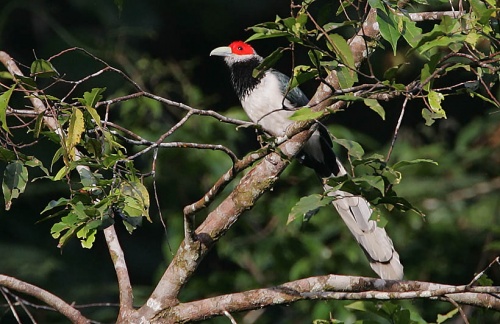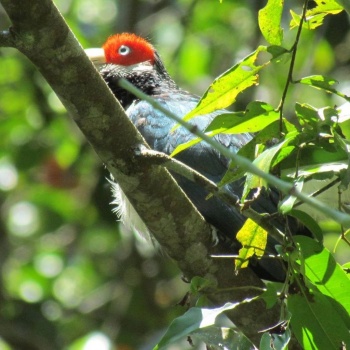Charlirox099 (talk | contribs) |
m (Remove Orientalbirdimages link) |
||
| (5 intermediate revisions by 4 users not shown) | |||
| Line 1: | Line 1: | ||
| − | [[Image:Red-facedMalkoha.jpg|thumb|500px|<br />Photo by {{user|Steve+G|Steve G}}<br />Sinharaja, [[Sri Lanka]], July, 2009]] | + | [[Image:Red-facedMalkoha.jpg|thumb|500px|<br />Photo © by {{user|Steve+G|Steve G}}<br />[[Sinharaja]], [[Sri Lanka]], July, 2009]] |
;[[:Category:Phaenicophaeus|Phaenicophaeus]] pyrrhocephalus | ;[[:Category:Phaenicophaeus|Phaenicophaeus]] pyrrhocephalus | ||
==Identification== | ==Identification== | ||
| − | A large | + | [[Image:IMG 10724.JPG|thumb|350px|right|Female<br />Photo © by {{user|Carol+Rushton|Carol Rushton}}<br />Sinharaja, [[Sri Lanka]], February 2016]] |
| + | 40–47 cm (14¾-18½ in); A large Malkoha with a long graduated tail: | ||
* Dark green back | * Dark green back | ||
* Green edged with white uppertail | * Green edged with white uppertail | ||
| Line 10: | Line 11: | ||
* Green bill | * Green bill | ||
*Dark iris | *Dark iris | ||
| − | |||
Sexes similar; the female has a white iris, juveniles duller | Sexes similar; the female has a white iris, juveniles duller | ||
| + | ====Similar Species==== | ||
| + | [[Blue-faced Malkoha]]: which doesn't have any red on the face. | ||
==Distribution== | ==Distribution== | ||
Endemic to [[Sri Lanka]].<br /> | Endemic to [[Sri Lanka]].<br /> | ||
Regularly seen at [[Sinharaja]] and other remaining rain forests. | Regularly seen at [[Sinharaja]] and other remaining rain forests. | ||
==Taxonomy== | ==Taxonomy== | ||
| − | This is a [[Dictionary_M- | + | This is a [[Dictionary_M-O#M|monotypic]] species<sup>[[#References|[1]]]</sup>. |
| + | |||
==Habitat== | ==Habitat== | ||
Found in tall rain forest. Also in scattered riverine habitats in the dry zone. | Found in tall rain forest. Also in scattered riverine habitats in the dry zone. | ||
==Behaviour== | ==Behaviour== | ||
| + | A shy inhabitant of the tree canopy. | ||
| + | ====Diet==== | ||
Feeds on insects (caterpillars, giant stick insects, mantises) and small vertebrates (eg lizards). May occasionally take berries.<br /> | Feeds on insects (caterpillars, giant stick insects, mantises) and small vertebrates (eg lizards). May occasionally take berries.<br /> | ||
Usually seen solitary, in pairs or small flocks. Joins bird waves.<br /> | Usually seen solitary, in pairs or small flocks. Joins bird waves.<br /> | ||
| − | |||
====Breeding==== | ====Breeding==== | ||
Breeds in the first half of the year (and probably also August to September). The nest is a shallow saucer made of grass, twigs and roots. It's placed in a high bush in a forest area with thick undergrowth. Lays 2 to 3 eggs. | Breeds in the first half of the year (and probably also August to September). The nest is a shallow saucer made of grass, twigs and roots. It's placed in a high bush in a forest area with thick undergrowth. Lays 2 to 3 eggs. | ||
==References== | ==References== | ||
| − | #{{Ref- | + | #{{Ref-Clements6thAug18}}#Handbook of the Birds of the World Alive (retrieved January 2019) |
{{ref}} | {{ref}} | ||
==External Links== | ==External Links== | ||
{{GSearch|Phaenicophaeus+pyrrhocephalus}} | {{GSearch|Phaenicophaeus+pyrrhocephalus}} | ||
| − | + | ||
http://charlirox-slbirds.blogspot.com/2011/09/watha-rathu-malkoha-red-faced-malkoha.html | http://charlirox-slbirds.blogspot.com/2011/09/watha-rathu-malkoha-red-faced-malkoha.html | ||
[[Category:Birds]] [[Category:Phaenicophaeus]] | [[Category:Birds]] [[Category:Phaenicophaeus]] | ||
Latest revision as of 03:24, 7 May 2020
- Phaenicophaeus pyrrhocephalus
Identification
40–47 cm (14¾-18½ in); A large Malkoha with a long graduated tail:
- Dark green back
- Green edged with white uppertail
- White belly and undertail, undertail barred black
- Black throat and crown, white lower face
- Large red patch around eye
- Green bill
- Dark iris
Sexes similar; the female has a white iris, juveniles duller
Similar Species
Blue-faced Malkoha: which doesn't have any red on the face.
Distribution
Endemic to Sri Lanka.
Regularly seen at Sinharaja and other remaining rain forests.
Taxonomy
This is a monotypic species[1].
Habitat
Found in tall rain forest. Also in scattered riverine habitats in the dry zone.
Behaviour
A shy inhabitant of the tree canopy.
Diet
Feeds on insects (caterpillars, giant stick insects, mantises) and small vertebrates (eg lizards). May occasionally take berries.
Usually seen solitary, in pairs or small flocks. Joins bird waves.
Breeding
Breeds in the first half of the year (and probably also August to September). The nest is a shallow saucer made of grass, twigs and roots. It's placed in a high bush in a forest area with thick undergrowth. Lays 2 to 3 eggs.
References
- Clements, J. F., T. S. Schulenberg, M. J. Iliff, D. Roberson, T. A. Fredericks, B. L. Sullivan, and C. L. Wood. 2018. The eBird/Clements checklist of birds of the world: v2018. Downloaded from http://www.birds.cornell.edu/clementschecklist/download/
- Handbook of the Birds of the World Alive (retrieved January 2019)
Recommended Citation
- BirdForum Opus contributors. (2024) Red-faced Malkoha. In: BirdForum, the forum for wild birds and birding. Retrieved 25 April 2024 from https://www.birdforum.net/opus/Red-faced_Malkoha
External Links
http://charlirox-slbirds.blogspot.com/2011/09/watha-rathu-malkoha-red-faced-malkoha.html





